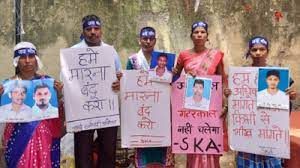INDIA: Translation of 12 Tamil Dalit literary works into English to bridge cultural divide
Since last month, numerous contract sewer workers employed by the Delhi Jal Board from various zones in Delhi have been terminated abruptly, without any advance notification. Many of these workers, with a decade or more of service, were not paid their salaries for the last two months and were unexpectedly let go this month. Authorities failed to issue any formal notice, leading to a sense of shock among the hundreds of affected workers.

Responding to this sudden wave of terminations, a Public Hearing took place at the Constitution Club of India in New Delhi on 28th December. Union leaders have decided to approach CEO, Delhi Jal Board with the suggested recommendations that the jury has provided along with the workers.
During the public hearing , fifteen sanitation workers took the stage to share their concerns, addressing a 10-member jury panel that included Supreme Court lawyer Colin Gonsalves, former Member of Parliament and AIKS Vice President Hannan Mollah, State Level Shelter Monitoring Committee member Indu Prakash Singh, Central trade union CITU National Secretary Amitav Guha, Assistant Professor in Delhi University Sarita Bhoi, Director of Center for Workers Management Dithi Bhattacharya, Social activist Anil Varghese, Chairman of Delhi High Court Monitoring Committee Advocate Harnam Singh, Chairman of Delhi Safai Karmachari Commission Sanjay Gehlot and The Mooknayak’s founding editor Meena Kotwal.
During the Public Hearing, approximately 300 workers hailing from various parts of Delhi gathered to voice their grievances before the Jury Panel and the assembled audience. Their testimonies unveiled startling revelations about the challenging circumstances they face in their workplaces.
Workers from Pitampura in West Delhi shared that they were kept in the dark about their exact wages, receiving cash payments without any accompanying receipts from their supervisors. An anonymous worker, with 15 years of service, lamented, “We’ve been working for 15 years; many contractors come and go, but we have to fight for our daily wage of 450 Rupees!”
 Another worker, employed in Navjeevan Vihar, disclosed that he hadn’t received his salary even during Diwali and Dussehra, forcing his family to rely on loans for survival ever since.
Another worker, employed in Navjeevan Vihar, disclosed that he hadn’t received his salary even during Diwali and Dussehra, forcing his family to rely on loans for survival ever since.
A worker hailing from Kalkaji in South Delhi shared a distressing account, revealing that he was abruptly dismissed from his job on December 7th, devoid of any advance notice or explanation.
Another concerning incident unfolded at the Eidgah store, where a worker, in an attempt to address the non-payment of his salary, approached government authorities. Shockingly, following the filing of the complaint, he faced retaliation and was subsequently terminated from his position. Adding to the gravity of the situation, this worker has remained unemployed, as no contractor has extended an offer of employment since.
A sanitation worker under Delhi Jal Board revealing his plight in front of the jury
The sudden job losses have deeply affected workers in Delhi, some with over a decade of service, hoping for stable positions with Delhi Jal Board. Unpaid salaries during the festive season compounded their financial struggles. Many, particularly from marginalized communities, face heightened challenges supporting their families. About 100 stores, acting as area-wise offices for sewer maintenance under DJB, employed both permanent and contractual workers. With only 1,500 permanent employees remaining, concerns arise about the future of sewer cleaning in Delhi, especially as many are nearing retirement The Jury gave the following recommendations.
The Jury gave the following recommendations.
Reinstatement of all contractual sewer workers and payment of all pending dues including wages, Provident funds and other social securities.
As per the minimum wages notification of Delhi government for unskilled labour (Dated: 1st October 2022), workers must be paid a minimum wage of at least ₹17,494/- per month.
While appreciating the effort of the Aam Aadmi Party government to regularize 700 contractual workers of DJB, they must regularize all contractual employees who have worked for more than 240 days and the gaps in employment should be considered a sham and bogus.
Implementation of court orders of Writ petition (Civil) 5232/2007 in letter and spirit. Also, implementation of supreme Court orders dated 20/10/2023 recommending payment of ex gratia of ₹30 lakh in case of death. The Jury also recommends that the compensation be paid immediately without any delay.
ESI and Identity Card for all workers in all sectors.
Provision of scholarship for children of sewer workers in educational institutions.
Where is the Data?
On July 28, 2022, Minister of State for Social Justice and Empowerment Ramdas Athawale asserted that there have been no reported deaths due to manual scavenging in the past five years. This statement came in response to a written question posed by Mallikarjun Kharge and Dr L Hanumanthaiah in the Rajya Sabha, addressing issues related to manual scavenging, associated fatalities, and the rehabilitation of manual scavengers.
Contrary to the data presented by the central government in February of 2022, which reported 340 deaths in the last five years from cleaning sewers and septic tanks, Athawale’s response reflects a different perspective. According to Bezwada Wilson, the national convener of the Safai Karmachari Andolan, the actual number is 472 deaths, 132 more than the figure presented in the last Parliament session.
According to a research paper featured in Economic & Political Weekly (EPW) in 2020, out of the 1.2 million manual scavengers in India, 95-98 percent are women, predominantly belonging to specific castes such as Valmikis, Haila, Halalkhor, Mister, and Dome.
Courtesy : The Mooknayak





